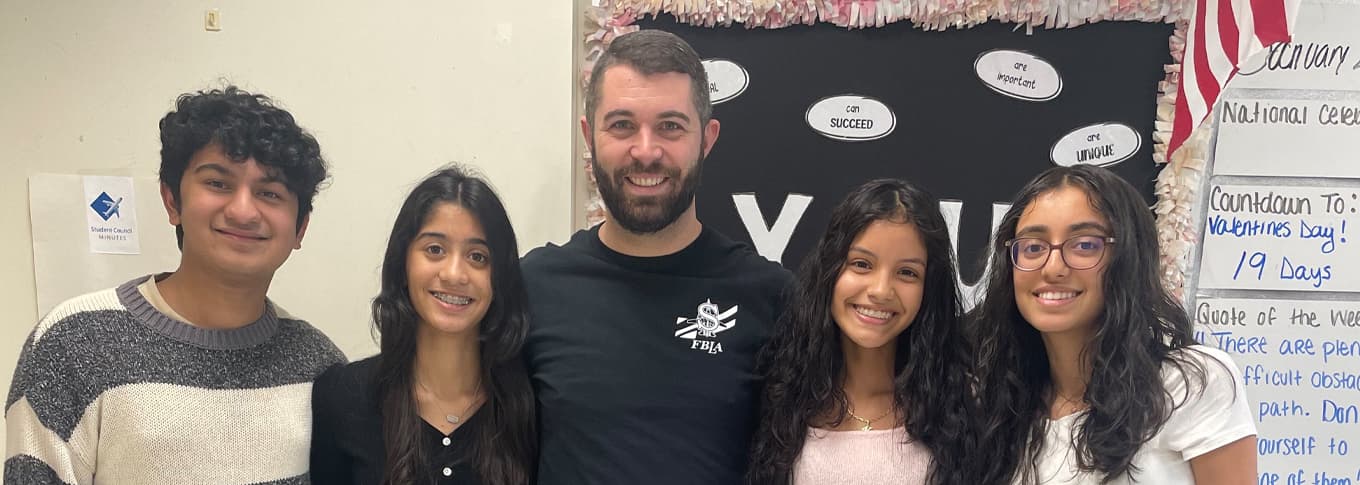Social Innovation team profile

“The challenge demonstrated how working alongside one another, we can really accomplish something bigger than when we work alone,” Jai said. “Businesses aren't run by just one person – they need many people to succeed.”
When you’re launching a new company, creating buzz and driving website traffic is a critical step to success. A well thought-out social media push is the perfect way to do it, particularly when your target audience is made up of high school and college students who spend a significant portion of their day on Instagram and Twitter.
That’s why team Minority Mixers from Sayreville War Memorial High in Parlin, New Jersey, leaned heavily on these social channels to market their new internship program, designed to match young aspiring entrepreneurs from underrepresented groups with minority-run small businesses.
Shriya Patel, Jai Desai, Riva Babaria and Kristy Garcia – all students heavily involved in the Future Business Leaders of America (FBLA) and Distributive Education Clubs of America (DECA) – were inspired to take on Intuit’s Fall 2022 Social Innovation Challenge when they read the prompt: How might we help underrepresented aspiring entrepreneurs access resources to help them start their business?
“When I read the prompt, I was able to draw parallels between the healthcare field and business, and how important it is to ensure that minorities have equal representation and opportunities in both areas,” said Jai, who is interested in pursuing healthcare administration as a career.
“I'm interested in going into the business field,” Kristy said. “I wanted to participate in this challenge to see how I could impact the future generation by providing more equitable opportunities for underrepresented individuals – while also setting myself up for success.”
Mixing it up
The Minority Mixers’ internship program matches high school and college students with mentors, giving them the opportunity to advance their business knowledge and develop connections with business owners. The founders match applicants to businesses, and internships last for four months. In addition to providing a platform for finding internships, the website includes tips and tricks on a variety of business-related topics, and information about how to access resources for starting a business.
The internship program already has five applicants, and two businesses have expressed interest, as well. The founders credit their comprehensive social media strategy for the program’s momentum. “From the beginning, we incorporated a human element into our social media,” Riva said. “We wanted to get people to go and click on the website because that's where all of the information is.”
“We introduced ourselves on Instagram in our first post, then followed nearby small businesses and tons of kids from school,” Shreya said. “One of our TikTok posts had over 700 views, and we’ve reached people across the country, from Pennsylvania to California.”
According to the founders, participation in the internship program is mutually beneficial for interns and minority-owned businesses. “Minority-owned businesses, especially smaller ones, often have fewer resources and tighter budgets, and may try to take on everything themselves,” Jai said. “Through the site, they can access volunteers and interns who are looking to learn and gain experience, for little or no pay.” Riva added that younger interns can offer a fresh new perspective and are very familiar with digital technologies and social media, which can be beneficial for business owners who may be a little bit older.
Discovering what it takes
The Minority Mixers placed third overall in the Social Innovation competition. Each student received a $2,000 scholarship and a pair of AirPods. But they came away with a lot more than prize money.
Throughout the challenge, the founders sharpened various business skills, including project management, collaboration and brainstorming. “I've never really had the experience of managing a project that has an impact on the public,” Kristy said. “There’s so much planning behind the scenes, and a lot of time and effort that goes into it. It’s important to collaborate with your team members because everyone has different and valuable ideas.”
The Minority Mixers plan to continue developing their internship program, now that the challenge has ended. “We’re going to talk to the businesses, review all of the applications, and start matching mentees with mentors,” Shreya said. “Then we’ll work to build those connections, and refine the program based on the feedback we collect from everyone.”
How will they collect feedback? Surveys and debriefs over Zoom. “We’ll stay in contact with participants to see how they’re growing and enjoying the program over time,” Jai said.
Becoming leaders
The founders said the best part of the challenge was the challenge itself, because it helped them connect and become leaders and help each other grow. “This project has taught me how to be a leader, because developing something as complex as an internship program doesn’t come easy!” Shreya said.
“Working with a mentor from Intuit who is so experienced is such a unique opportunity,” Kristy said. “And being able to see the impact our project may have on underrepresented communities is such an amazing thing to see.”